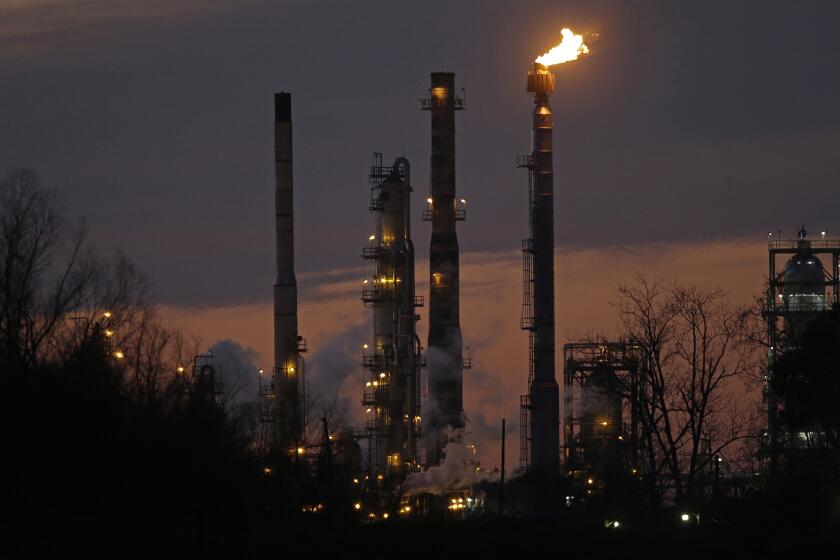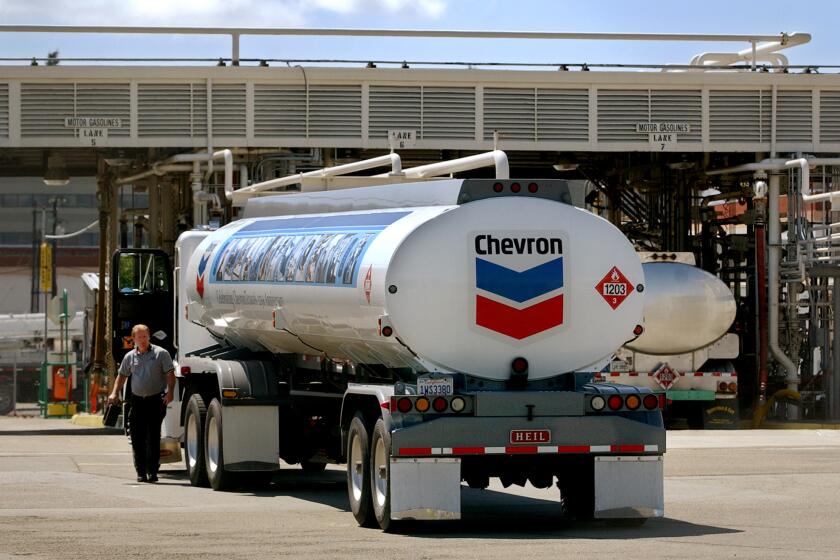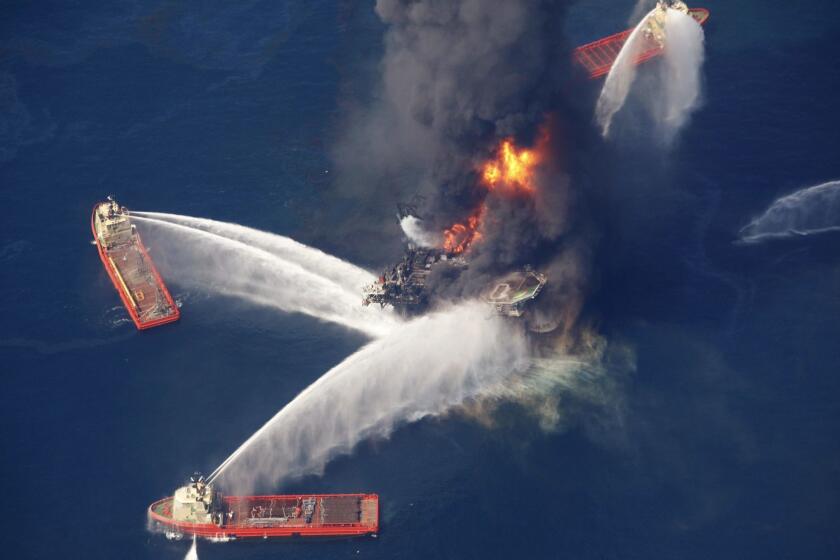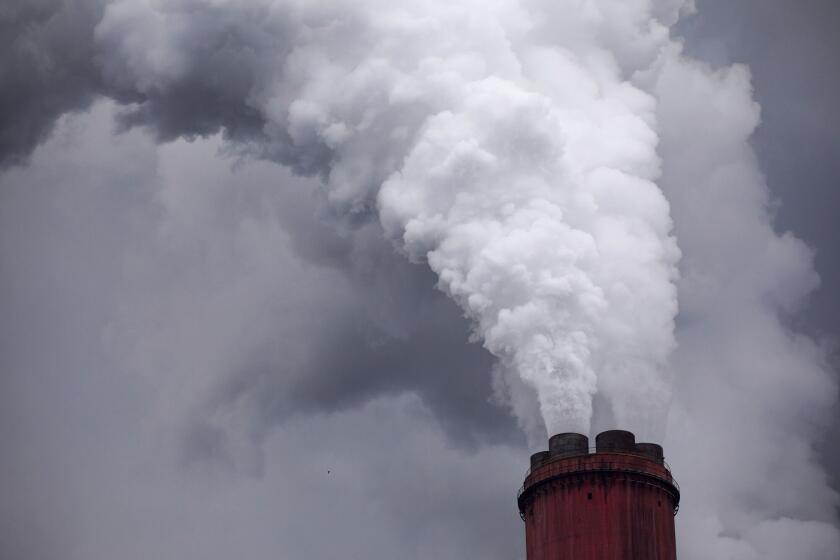Exxon Mobil is using a bizarre Texas rule to harass a California beach city
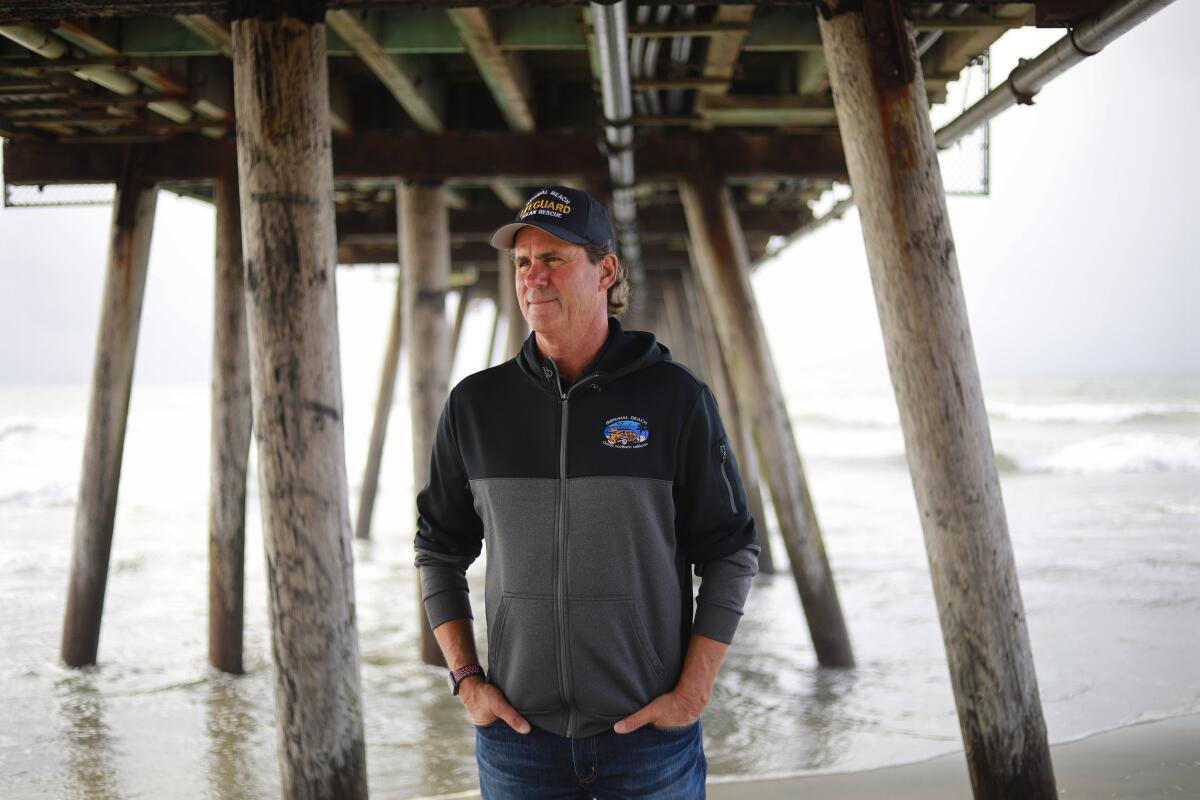
- Share via
Serge Dedina is the mayor of Imperial Beach, a surfers’ haven on the Mexican border that is one of the poorest municipalities in San Diego County.
Exxon Mobil is the nation’s biggest oil company, with more than $214 billion in revenue over the last 12 months and nearly three times as many employees as Imperial Beach has residents.
So when Exxon Mobil pleads in court that Dedina and his city have been engaged in a nearly decade-long conspiracy to stifle its 1st Amendment free-speech rights, that’s a claim that should make you go, “Hmm.”
These are companies with unlimited resources, and they’ve decided to use them against beach communities without these resources.
— Imperial Beach Mayor Serge Dedina
Exxon Mobil has made that assertion in the course of its effort to use a bizarre Texas courthouse rule allowing a would-be litigant to demand depositions and documents from potential targets without first filing a lawsuit.
The oil company has asked the Texas courts to order compliance from Dedina and 14 other California municipal officials.
Get the latest from Michael Hiltzik
Commentary on economics and more from a Pulitzer Prize winner.
You may occasionally receive promotional content from the Los Angeles Times.
What put them on Exxon Mobil’s enemies list is that they represent California cities and counties that have sued Exxon Mobil and other oil companies over the consequences of global warming, which stems from the burning of the companies’ products.
The oil company’s demands for depositions and documents are part of a long campaign by the fossil fuel industry to harass and intimidate its critics rather than meeting their criticisms head-on.
“This is an industry with a 30-year history of bullying and harassment and intimidation of its opponents,” says Naomi Oreskes, co-author of the 2010 book “Merchants of Doubt,” which documented how a network of ad agencies, public relations firms, conservative groups and corporate-beholden scientists had undermined public perception about the dangers of tobacco and global warming.
The critics’ fundamental point is that oil and gas companies systematically concealed what their own scientists knew about the effect of their products on global warming. Meanwhile, they were publishing misleading op-eds and advertisements questioning the connection.
Exxon Mobil certainly has succeeded in imposing costs on the cities and counties with the impudence to challenge the company in court.
Exxon Mobil shareholders may force change on the giant oil company, starting this week.
“What has people concerned is what’s next, what’s the next strategy,” Dedina told me. “These are companies with unlimited resources, and they’ve decided to use them against beach communities without these resources.”
Imperial Beach is a city of 27,000 residents that has increasingly seen damage from sea level rise in recent years.
“We’re trying to build a swimming pool, and a senior center, and a parks and recreation department, but we’ve been wrecked financially because we’ve been devastated by coastal flooding,” says Dedina, who is also executive director of Wildcoast, a nonprofit that works to protect coastal and marine ecosystems from the effects of global warming. “We’re paying the cost of coastal flooding that the fossil fuel companies caused and lied about.”
The California plaintiffs — in addition to Imperial Beach, the counties of San Mateo, Marin and Santa Cruz, and the cities of Richmond, Oakland and San Francisco — are seeking to force oil and gas companies to compensate them for the costs of sea level rise, among other consequences of global warming.
The cases are pending, but their procedural course is uncertain. In May, the U.S. Supreme Court ordered the 9th Circuit Court of Appeals to reconsider a ruling that returned them to state court after the oil and gas companies got them transferred to federal court.
Exxon Mobil’s response could charitably be described as outlandish. The company asserts that the California lawsuits, along with cases brought by New York and Massachusetts attorneys general, are the product of a conspiracy hatched at a “conference of special interests” in La Jolla in June 2012.
“The participants advocated for government investigations and litigation against energy companies to ‘pressure’ the targets to provide ‘support for legislative and regulatory responses to global warming,’” the company says.
Big oil companies shower consumer and environmental groups with subpoenas, burdening them with costs.
Their goal, the company asserts, was to “coerce Exxon Mobil and others operating in the Texas energy sector to adopt policies aligned with those favored by local politicians in California.” Today, the company pleads, “Exxon finds itself directly in that conspiracy’s crosshairs.”
A look at the official report of the La Jolla meeting — which was actually billed as a “workshop on climate accountability, public opinion, and legal strategies” — should demonstrate the absurdity of those claims. The workshop organizers included Oreskes, then a professor of the history of science at UC San Diego, and Peter C. Frumhoff, chief climate scientist at the Union of Concerned Scientists. Oreskes is now on the faculty at Harvard.
None of the public officials now being targeted by Exxon Mobil was among the 22 attendees. They were mostly scientists, environmentalists and university professors; four were practicing lawyers. The participants were listed in the report, along with a group photograph.
“If it were a plot, plotters and conspirators don’t tend to publish their findings,” Frumhoff told me. The goal, he says, was to build on what was learned from legal challenges to the tobacco industry and see if that could be applied to fossil fuel companies.
“Exxon’s fixation on this,” Frumhoff says, “is a flimsy and shameless effort to divert attention from its own corporate misconduct, and to apply pressure to local officials who are considering filing lawsuits to try to seek funding to pay for the damages from climate change that would not have happened but for the actions of fossil fuel companies like Exxon.”
That brings us to Exxon Mobil’s attempt to exploit the Texas court system’s unique Rule 202, which allows prospective litigants to seek pre-lawsuit depositions and documents from potential targets and witnesses. Texas isn’t the only state allowing pre-suit depositions, but its rule is the broadest.
Big corporations are known for being two-faced — presenting a nurturing, maternal face to the outside world while ruthlessly pursuing profit on the inside.
Some states and the federal courts provide for pre-suit depositions when it appears that testimony might not be available after a lawsuit is filed — a potential witness is terminally ill and might die before trial, say. Texas allows them to determine whether it will be worthwhile to bring a lawsuit at all — “the look before the leap,” as veteran Texas trial lawyer Paul Gold called it in a 2018 paper.
To pursue its deposition demand, Exxon Mobil has wrapped itself in the Texas flag, even soliciting a friend-of-the-court filing from Texas Gov. Greg Abbott, who told the state Supreme Court that the California plaintiffs are trying to “dictate the behavior and speech of the energy industry in Texas.”
Abbott added: “No Texan voted for any of these meddling California officials,” who should “mind their own business in California if they want to stay out of court in Texas.”
The company has to portray the defendants’ lawsuits as attacks on the state of Texas rather than itself, thanks to the intricacies of courthouse procedure.
Without getting into the details, suffice to say that for Texas courts to impose their will on out-of-state targets, there must be a showing that the targets committed some offense in Texas. Think of a Californian who causes a car accident in Dallas, then flies home — that motorist could be served in California and hauled into a Texas court.
Exxon Mobil alleges that the California officials were guilty of a Texas offense by trying to suppress “Texas-based speech about climate and energy policies.” That’s how the company put it in a brief filed with the Texas Supreme Court on Sept. 10.
“The attempt to make these cases into an attack on Texas is classic misdirection,” Oreskes says.
It’s rather a stretch to describe the lawsuits as directed specifically at Texas or Texas companies, as it happens. Most of the 32 defendants named in the suit brought by Imperial Beach and its co-plaintiffs aren’t Texas-based; they include companies headquartered in Oklahoma, Missouri, New York, Spain, Canada, France and Venezuela.
One of the fattest targets, Chevron, is headquartered in California. (Exxon Mobil itself isn’t even really a Texas company — although it maintains a headquarters in the Dallas metroplex, it’s actually incorporated in New Jersey.)
In any event, Exxon Mobil’s legal attack “ignores the actual allegations in the California lawsuits, which focus on each company’s allegedly misleading and deceptive efforts to increase the sales and use of their products through a deliberate campaign of disinformation,” San Francisco said in its brief to the Texas Supreme Court.
The oil industry has been depicting itself lately as the target of a conspiracy by scientists, local government officials and climate change activists to make it look bad.
Exxon Mobil originally asked a Texas trial judge in Fort Worth to grant permission for depositions from the California officials in 2018.
The judge obligingly bestowed a legal wet kiss on his hometown oil company, finding that the California officials intended to “expressly target the speech, research, and funding decisions” of Exxon Mobil and other Texas-based companies “to chill and affect speech, activities, and property in Texas.”
A Texas appeals court ruled last year that the judge was way off base. Even though Exxon Mobil is headquartered in Texas, lawsuits filed in other states targeting the company aren’t tantamount to offenses committed in Texas, the appeals judges found.
“These out-of-state actions were directed at Exxon, not Texas,” they wrote, therefore the Texas courts had no right to force the California officials to give depositions to Exxon Mobil before it filed a lawsuit. They also confessed to “an impulse to safeguard an industry that is vital to Texas’ economic well-being.” They described the California lawsuits as “lawfare,” which is the exact same term that Exxon Mobil used to describe them. But they regretfully turned the company down.
What’s most telling about Exxon Mobil’s response to the California lawsuits is how sharply it departs from its own shareholders’ view of the threat of global warming. At the company’s annual meeting in May, shareholders elected to its board three insurgent members who had expressed explicit concerns about the company’s environmentally unfriendly business model. “This is not a company embracing the idea of change from the inside out,” Oreskes says.
Dedina says he and his fellow California plaintiffs are unmoved by Exxon Mobil’s bullying.
“We’re not going to back down, we’re not intimidated, we’re not going away. What are they going to do to us?” he asked, referring to the fossil fuel industry. “Flood our cities more? Cause more wildfires? It’s already happening. What these companies are really afraid of is that there are going to be more and more cities and counties and states filing lawsuits.”
More to Read
Get the latest from Michael Hiltzik
Commentary on economics and more from a Pulitzer Prize winner.
You may occasionally receive promotional content from the Los Angeles Times.

